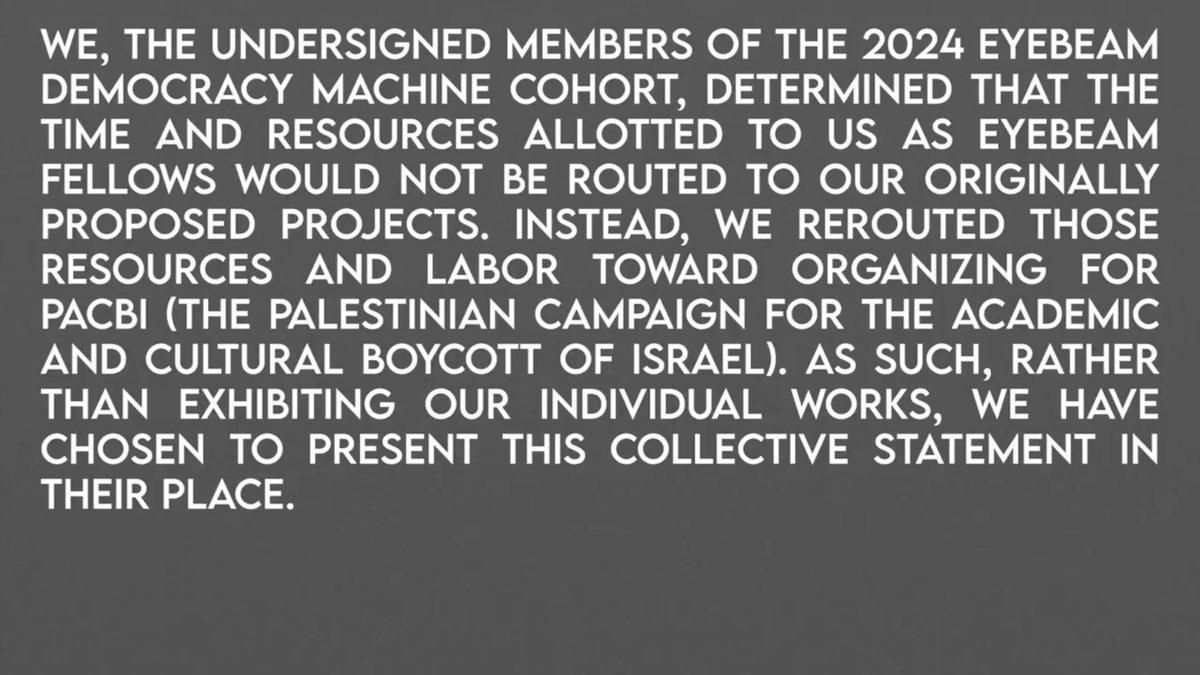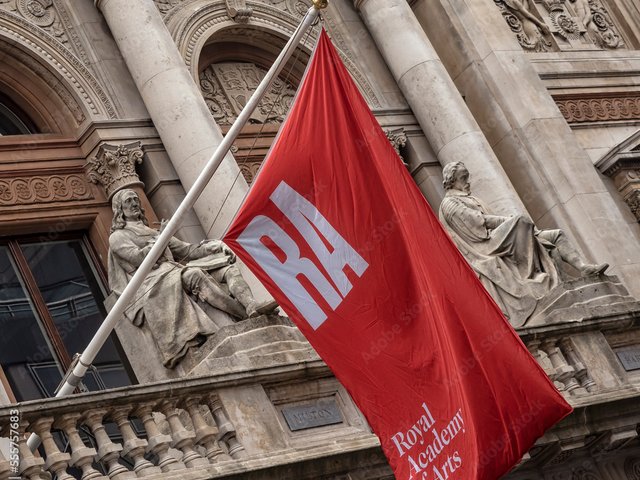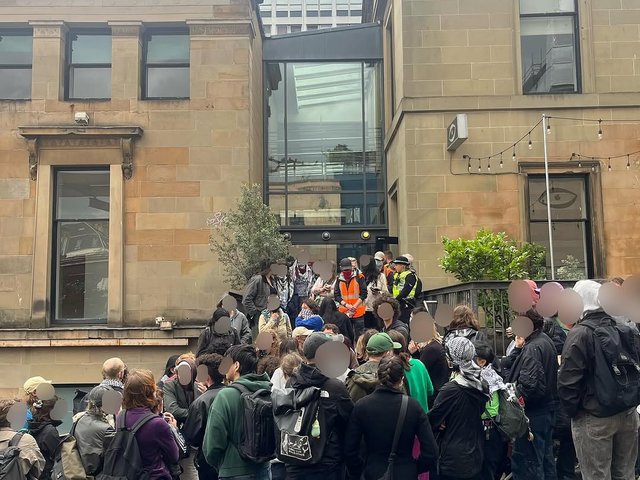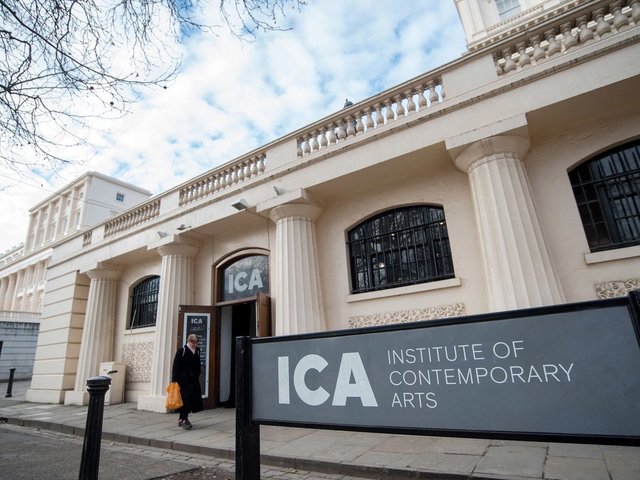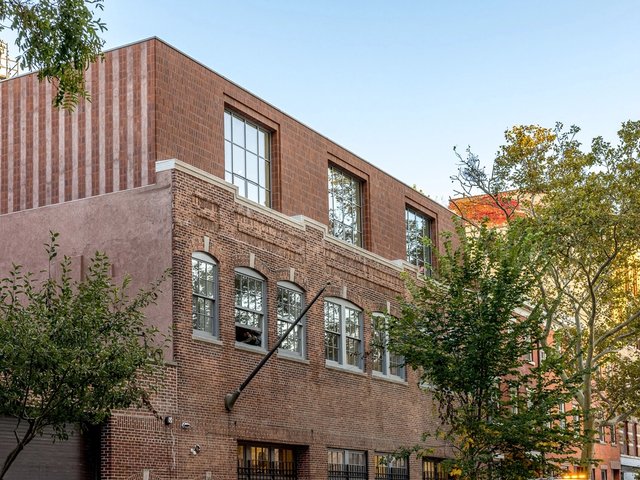Two former employees of Eyebeam, a non-profit art and technology centre in Brooklyn, New York, believe they were terminated for publicly supporting a statement in which ten artist fellows called on the organisation to endorse the Palestinian Campaign for the Academic and Cultural Boycott of Israel (Pacbi).
Artists in the Eyebeam Democracy Machine cohort installed a single-channel video displaying a statement of dissent during their final showcase on 28 September 2024 at the National Academy of Design in Manhattan.
The video statement came weeks after the artists chose to withdraw the individual projects they applied to the programme with from the fellowship’s showcase, and followed a statement they released last March urging Eyebeam to call for a permanent ceasefire in Gaza and to endorse the Palestinian Campaign for the Academic and Cultural Boycott of Israel (Pacbi).
"We found ourselves at odds with the palace of language constructed to house us, having witnessed the failings of the ‘Democracy's Machine’ in rising to the call for Palestinian liberation over the course of our Eyebeam fellowships," the group’s video statement reads in part. Its display at the National Academy of Design comprised one screen fitted with two headsets playing an audio recording of one of the artists reading the text aloud for accessibility.
The statement was signed by members of the cohort including Begoo Collective, Cielo Saucedo, Mashinka Firunts Hakopian, Nat Decker, Sam Rabiyah, Sammie Veeler and Xiaowei Wang. All but one member of the cohort withdrew from the showcase and endorsed the statement. The Democracy Machine is a six-month initiative that awards artists working between contemporary art, design and technology $20,000 in funding. The 2024 fellowship ran from 15 February to 15 August.
In an email to The Art Newspaper, the artist signatories said they witnessed a "culture of repression, silencing and unexplained staff terminations—specifically, related to Palestinian solidarity organising" throughout their remote six-month fellowship run by the non-profit. The group's statement at the showcase indicated that it had rerouted fellowship resources toward organising for Pacbi, included hours spent drafting its statements, preparing the video work, corresponding with Eyebeam about Pacbi and discussing Pacbi (including excerpts from the boycott’s official guidelines) with Eyebeam’s executive leadership.
In a statement to The Art Newspaper, Eyebeam's executive director Roderick Schrock said the organisation had been supportive of the 2024 Democracy Machine cohort's public statement in the National Academy of Design showcase.
"The Democracy Machine, launched in 2021, was conceived to be a radical experiment and we intentionally embedded and invited dissent into the cycle. We were greatly supportive of the artist fellows’ statement; in fact, we platformed the statement in a specially produced artist showcase," Schrock said in a statement shared with The Art Newspaper.
He also highlighted Eyebeam's Palestine Futures initiative, launched in August 2024, which provided grants of $12,000 to five US-based Palestinian activists, artists and writers who are "engaged in creating Palestinian futures of equity and liberation". He added: "Each artist was awarded $12,000 in unrestricted funding to support their work in light of the escalating violence against the people of Palestine and the devastating acts of scholasticide and cultural erasure that accompany this violence."
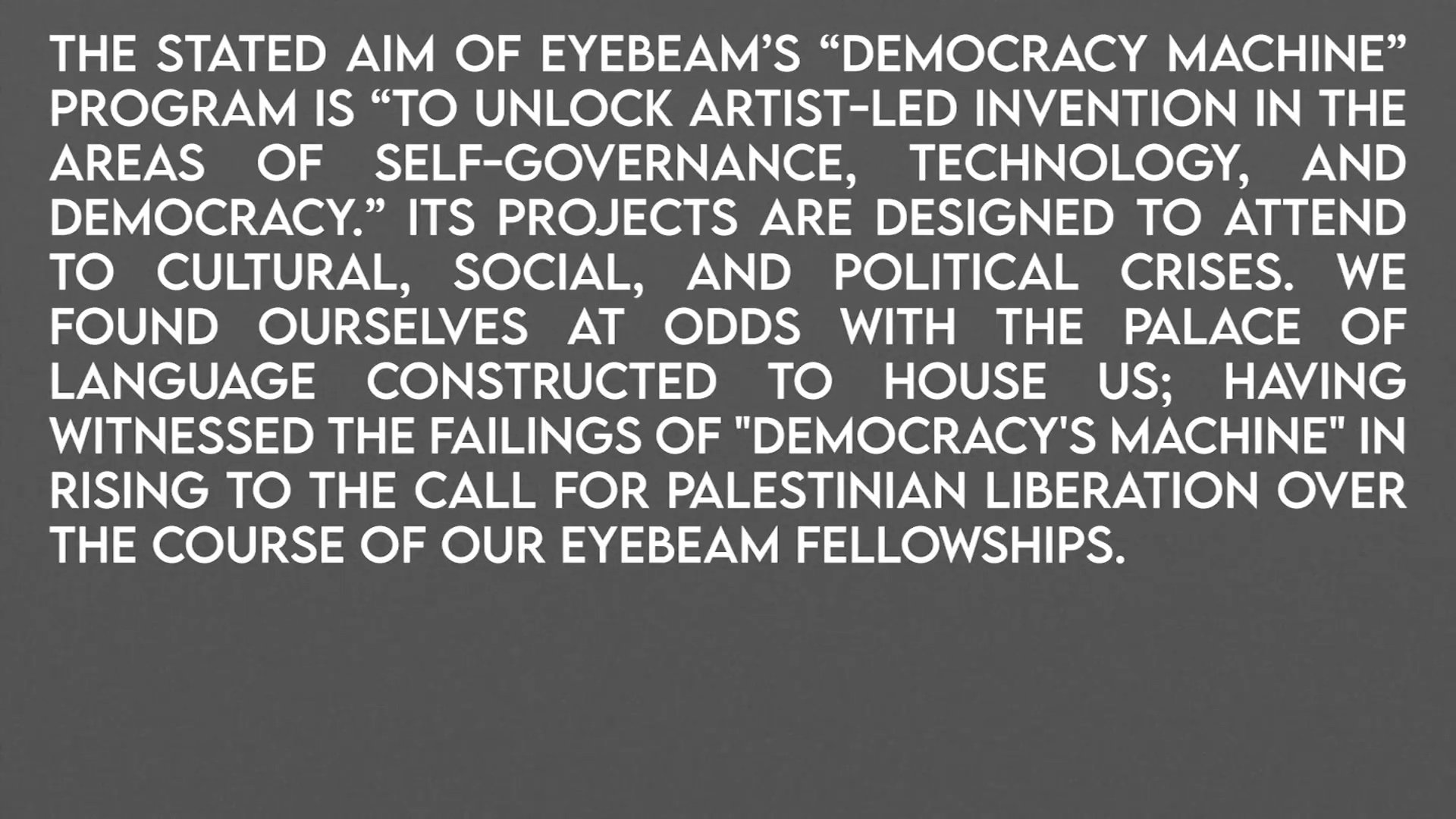
The third section of the 2024 Democracy Machine cohort's video statement Courtesy the artists
In March 2024, just weeks into the Democracy's Machine cohort's fellowship, the group released a statement calling on Eyebeam to join Pacbi that had been signed by nearly 100 people, half of whom said they were Eyebeam fellowship and residency alumni, former staff or affiliates. The artists say that three of the five Eyebeam staff signatories of the letter have since left the organisation—two were terminated and one resigned—an outcome many other signatories believe was retaliatory, according to a member of the Democracy Machine cohort who spoke on condition of anonymity out of concern for the group’s agreement to act as a collective.
Schrock has categorically denied that any of the staff departures were retaliatory in nature, describing the situation as a misunderstanding.
"We are saddened that a misunderstanding has taken place around staff departures that occurred in the spring in 2024," Schrock said in a statement. "Employees were not terminated for supporting a statement the artist cohort of our flagship fellowship endorsed, the Palestinian Campaign for the Academic and Cultural Boycott of Israel. We would like to clarify that a termination occurred based on performance; a second position was eliminated as we simply could no longer afford the role and the responsibilities were shifted into a position that allowed an opportunity for a staff member to be promoted; and a beloved fellow who had recently been hired as a staff person resigned to accept a new role elsewhere."
Sharsten Plenge, the former development manager at Eyebeam, was among the staff members who signed the letter in March; she was terminated later in the spring.
“As an organisation that claims to uphold a legacy of supporting artists who make 'radical' work with technology, I experienced Eyebeam in a state of perpetuating its own institutional polycrisis,” Plenge told The Art Newspaper via text message. “From attempts to censor and effectively silence the very artists it has a responsibility to materially respond to; to executive leadership, namely the director, gatekeeping discussions among staff and with the board.”
Before Plenge was terminated on 6 June, she and other staff members were required to undergo 360-degree employment assessments, which are meant to happen annually at Eyebeam but had not happened in three years. Even though she received a score of 3.8 out of 5, she was still terminated.
Kemi, a former employee who was supportive of the cohort's intervention (and only shared her first name for fear of retribution), was terminated several weeks before Plenge. She had been told in April that her position would no longer be needed but that she would be given ample notice of her position's end date and of future available positions. Instead, she was told her position was being eliminated on 29 April.
“This news devastated me because I had a deep connection with the artists,” Kemi told The Art Newspaper. She had helped develop the Democracy Machine programme. “I worked with artists to shape a narrative of what artist interventions into [institutional] funding for their projects could look like.”
The week after Kemi was terminated, another employee who had signed the cohort’s letter, Brent Bailey, announced his departure. “I stand with the artist fellows unequivocally,” Bailey wrote in an email to The Art Newspaper. “No organisation can call itself radical if it’s unwilling to speak out against an ongoing genocide.”
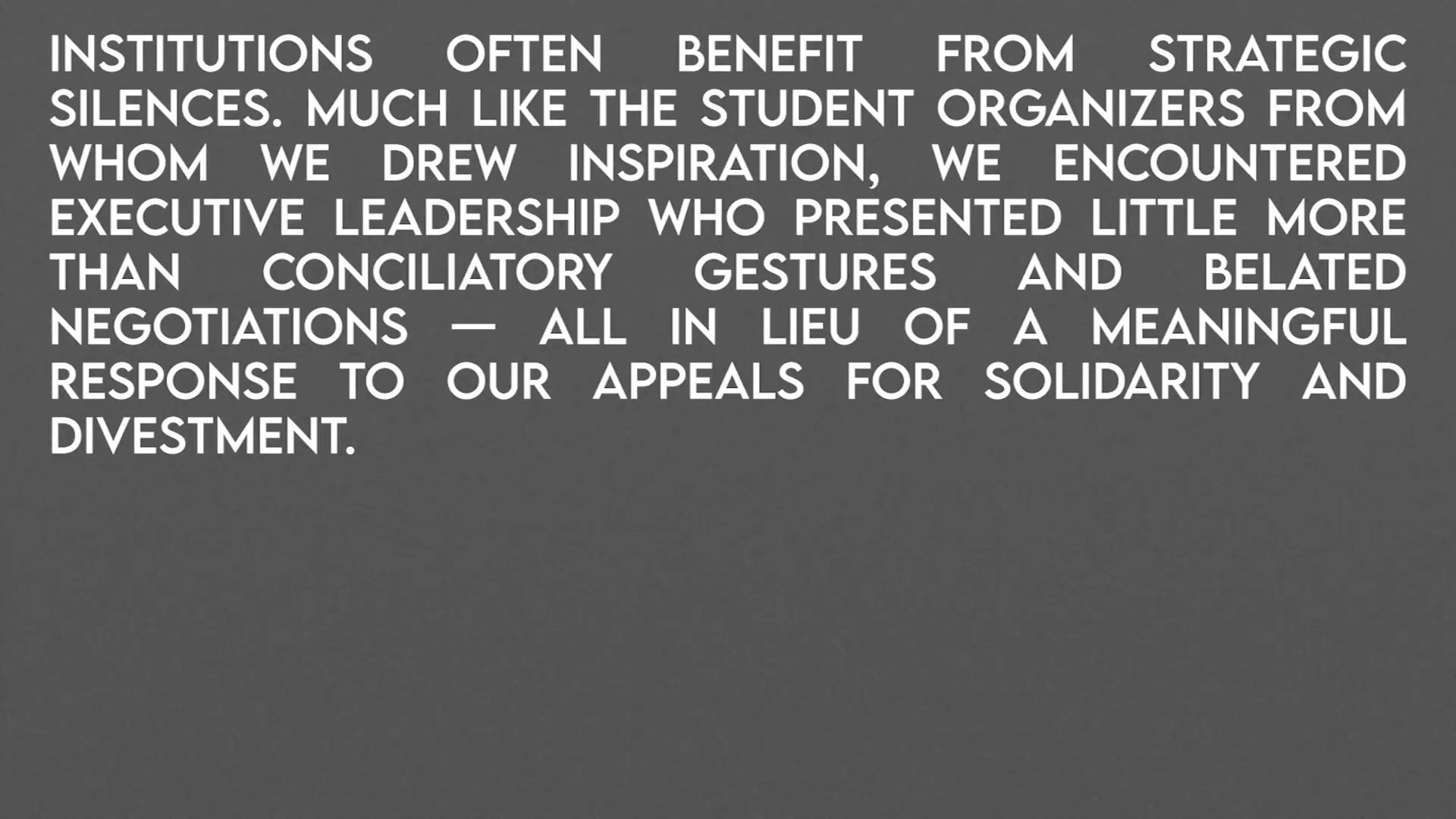
The fourth section of the 2024 Democracy Machine cohort's video statement Courtesy the artists
“Our initial intervention as [a] cohort was an invitation to the organisation to enter into dialogue,” the members of the 2024 Democracy Machine cohort told The Art Newspaper in a collective statement. “Since the showcase, executive leadership has not publicly addressed our intervention or made any offer of repair.”
The artists have circulated stills of the video statement on social media. They have received messages of support and solidarity in response, including from the Indigenous (Wixárika) artist Edgar Fabián Frías and the author and curator Arushi Vats.
“The withdrawal of our work is also an invitation to the organisation—an invitation to reconsider engaging in meaningful dialogue in support of Palestinian liberation,” the 2024 Democracy Machine cohort artists added. “That withdrawal responds to widespread attempts to silence collective organising, and aims to bring visibility to global calls for boycott and divestment.”


